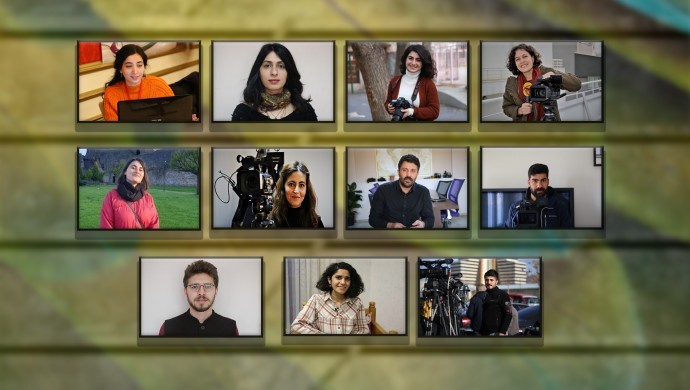The Turkish government has attracted condemnation and anger from press organizations and politicians within and without Turkey for the recent detention of 11 journalists working for pro-Kurdish media outlets in İstanbul and Ankara as well as other cities including in Diyarbakır in the Southeast.
Turkish police on Tuesday searched the premises of several pro-Kurdish media outlets and private residences across Turkey, rounding up 11 journalists working for the Mezopotamya news agency and JINNEWS, including the former’s editor-in-chief Diren Yurtsever.
The Ankara Police Department on Tuesday said in a written statement that the journalists were detained as part of an operation that targeted 14 individuals found to be functioning under the “press council” of the outlawed Kurdistan Worker’s Party (PKK) and producing news reports that “incite the public to hatred and enmity.”
The European Parliament’s Turkey rapporteur, Nacho Sanchez Amor, commented on the development in a written statement he sent to Euronews Turkish service on Tuesday, saying that the detentions were another example that pointed to the worsening of fundamental freedoms in Turkey, especially freedom of the press and freedom of expression.
Amor said the development was “grave” with respect to the critical elections of June 2023 that the country is readying for, adding that if the detentions and raids were carried out within the scope of a new media law in Turkey, it would confirm the fears of Turkish civil society, the Parliamentary Assembly of the Council of Europe (PACE) and many in the European Parliament regarding the law.
Described by the Turkish government as the “disinformation law,” the new law that introduces prison sentences for those “disseminating false information” was passed by the parliament earlier this month and went into effect on Oct. 18. It is found by the opposition and critics to be a further stifling of free speech in the country.
The International Press Institute (IPI), the global network of editors, journalists, and media executives, condemned the detention of journalists on Tuesday, calling on Turkish authorities to release them and all other reporters behind bars without delay.
“Turkey regularly abuses anti-terror law to target journalists, who are frequently subject to arbitrary charges and imprisonment. The detentions [of 11 journalists] fit a pattern of serious attacks on press freedom in Turkey,” IPI said, underlining that they stand in solidarity with all their colleagues.
“We … see these operations against our colleagues, [which come] as we ready for the elections as a new attack on the citizens’ right to receive news and access the truth. Journalism is not a crime,” the Turkish Journalists Union (TGS) said in a statement released on its website.
The Broadcasting and Print Workers Union (DİSK BASIN-İŞ) also demanded the immediate release of the detained journalists in a written statement shared on social media, calling on their colleagues and the entire society “not to remain silent” against such “oppression.”
“If you keep silent, one day it will be your turn. … We are not silent, we are not afraid, we stand by our colleagues,” they added.
Pervin Buldan and Mithat Sancar, co-chairpersons of the pro-Kurdish Peoples’ Democratic Party (HDP), the second-largest opposition party in the Turkish Parliament, also criticized the ruling Justice and Development Party (AKP) for the detention of the journalists.
“The government implemented the [new] censorship law with a torture operation against Kurdish journalists. You can’t subdue the truth, you will lose,” Buldan tweeted.
Claiming that the 11 journalists had guns pointed at them, were rear-handcuffed, laid on the ground and “tortured,” Sancar said the operation targeting them was part of a government plan to “silence critical media and society.”
Turkey, which has a poor record on freedom of the press, is known as one of the top jailers of journalists around the world.
Dozens of journalists critical of the government were jailed in Turkey on bogus terrorism or coup charges following a failed coup in July 2016 as part of an anti-coup fight launched by the government. Some of these journalists have been released from prison after serving their sentences.
Turkey is ranked 149th out of 180 countries in the annual media freedom index published by Reporters Without Borders (RSF) earlier this year.



